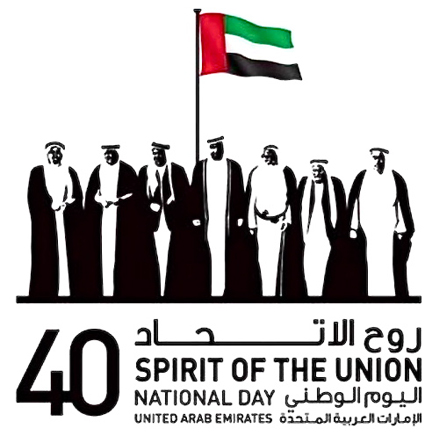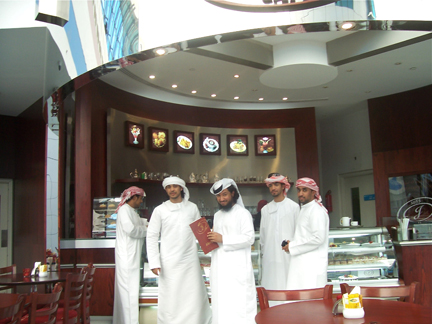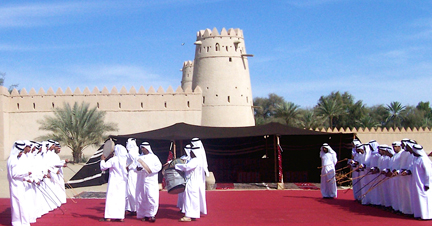
Spirit of the Union (UAE)
by el-Sayed el-Aswad, United Arab Emirates University
Over the past forty years there have been rapid transformations of the United Arab Emirates from rural and tribal communities to modern national states. Such transformations raise critical concerns related to authenticity, heritage, and social memory and identity construction. Heritage, indicating past and authentic lifestyles that people use in the construction of their identity, can be redefined according to a modern significance. Identity refers to the continuity of inherent constituents that last through all the various transformations individuals might undergo. Identity is not a given, but an ongoing activity that people engage in all the time.
In the UAE one observes continuous negotiations over ideas of authenticity, tradition, identity, modernity, leadership, and local-national performances. For example, this year the UAE is celebrating its 40th anniversary in terms of authenticity. The official site of the UAE National Day, “Spirit of the Unionâ€, includes such phrase as “Our Heritage, Our Pride,†“the Union shall forever remain,†and “It is the Spirit of the Union that celebrates our culture and heritage, and yet shapes our future.â€
Tradition is negotiated because it enters into the construction of social identity that is based on the concept of authenticity (aá¹£Äla). For the Emirates, aá¹£Äla (or aṣīl) is a multiple meaning concept that can imply values of rootedness, descent, origin, nobility, honor, self-sufficiency and social status. Authenticity also refers to good manners of people, men and women, defining gender relations.
Authenticity is extended to include tribal and local leadership that might go beyond local spheres. The late Shaikh Zayed, a visionary and caring leader who never forgot his roots, was the exemplary hero who established the new federal/union of Emirates in 12/2/1971, generating new images and narratives about Emirates. He represented both authentic and new-modern identity of the Emirates. “A nation without a past is a nation without a present or future†is a saying of Shaikh Zayed that Emiratis maintain. The new unifying concept of “the national†(muwÄá¹in) is locally used to encompass and unify various and multiple identities belonging to different tribes and locations. Emirati nationals view this new tribal/national identity (muwÄá¹in) as crucial in distinguishing themselves as authentic (aṣīl) from non-Emirati people.
To be more specific, Emiratis use the terms “national†(muwÄá¹in), implying “us,†and “non-national†(ghair muwÄá¹in), implying “them†or “otherâ€, expressing the dichotomy between indigenous heritage (turÄth aṣīl) and expatriate or foreign culture (dakhÄ«l or mub aṣīl). This dichotomy, however, is crucial for the Emirates whose nationals view themselves as being a “minority†in their homeland (where the expats outnumber them).
Emiratis consider themselves fortunate not only because they have huge revenue of oil, but also because they maintain their authentic heritage and identity amid rapidly changing world. The notion of “aṣīl†is also maintained in marriage selection. Among various economic services offered to Emiratis by the government is the Marriage Fund established in 1992, allowing a UAE national male groom to apply for a 70,000.00 AED ($19,058) marriage grant so as to marry an Emirati female (aṣīlah).
Emirati people choose to live in the traditional authentic style without rejecting modern life styles. They prefer to eat by hand (without using forks or spoons). They also prefer to wear traditional cloth (thaub) or gown (kandura) and cloak (‘abÄya). The Emiratis live and interact with each other in spacious gendered places such as the large reception hall (majlis).
Presently, “authenticity†extends to include commodities and marketable objects. I use the term “marketable authenticity†to refer to a cultural and material context in which new patterns of authenticity are created and enacted. For instance, Emiratis strive to create domestic patterns of fashion, communication and homes indicating a nostalgic return to a pre-oil stage, a return that relied on cultural heritage that can be promoted through market or commercial productions. This, in turn, implies a combination of authenticity and modernity.

Abu Dhabi Shopping mall
The marketable authenticity is reflected in both traditional market and modern shopping malls that have increasingly become the most spectacular arenas of social gathering (especially by Emirati younger generations), influenced by modernization and globalization. Various traditional items are reproduced and sold in these shopping centers (for both locals, expats and tourists). Local markets, challenged by attractive, globalized malls, are motivated to react by providing high quality products not only to maintain themselves but also to compete with grand shopping centers. Authentic local market strives to sustain local products including furniture, clothing, certain foods and goods such as dates, coffee, incense, and ladies’ henna. Such things are endlessly remade, constructed and exchanged based on the local desire to make them authentic in modern design. Emirates’ tourism manipulates museums and heritage villages for the same purpose.

Folk dance of ‘Aiyyala
In the Emirates folk performances such ‘aiyÄla, harbiyya, rizfa, al-ruwÄḥ and nadbah mirror both authentic or local and national identities. Al-‘AiyyÄla, the most widespread folk performance in the Emirates, is a tribal war dance in which two lines of indigenous tribesmen stand facing each other. Each line is composed of 10 to 15 male Emiratis wearing traditional white cloths and holding sticks. In the middle are two drummers and a leader. While performing they chant folk poetry addressing social virtues of honor, victory and dignity. Locally, al-‘AiyyÄla is basically performed in specific social occasions especially wedding celebrations. Nationally, the newly established state has adopted al-‘AiyyÄla performance to be conducted in the occasions of National Day (al-’Eid al-Waá¹anÄ«).